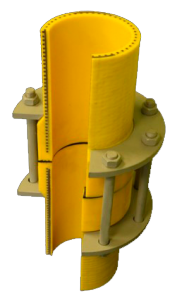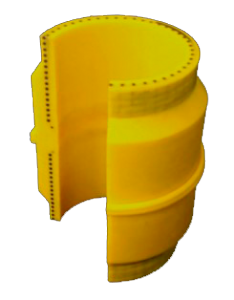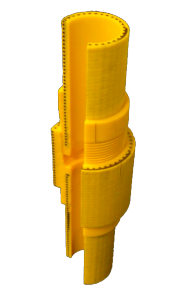RCLP is a polymer pipe, reinforced with a steel metal frame. A rigid lattice frame welded from steel wire shapes an RCLP. This frame is surrounded by a layer of polymer material, which forms inner and outer surfaces of an RCLP. The frame increases pipe strength and is corrosion resistant as it is isolated from the external environment by the polymer.
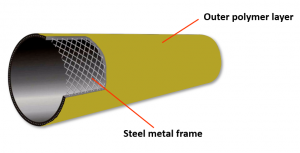 RCLP combines the qualities of metal and polymer pipes, where rigid metal frame provides strength close to that of steel pipes, and polymer provides its unique qualities of resistance to agressive environments.
RCLP combines the qualities of metal and polymer pipes, where rigid metal frame provides strength close to that of steel pipes, and polymer provides its unique qualities of resistance to agressive environments.
RCLP have already shown 20+ years in operation at 750 psi pressure as infield pipelines for transportation of bottom water and oilwell product.
OILTECHPIPE RCLP is available in diameters from 3,5″ up to 12″. And operating pressures up to 750 psi.
RCLP production technology allows to change the final product characteristics depending on specific requirements. With possibility to change the steel wire diameter and shape, as well as the cell dimentions, RCLP can withstand a much higher pressure.
ADVANTAGES:
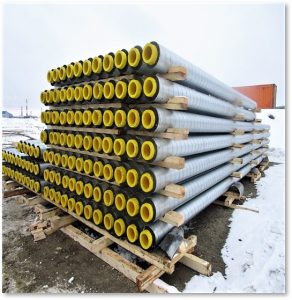 √ The rigidity of our pipes is comparable to the rigidity of steel pipes but RCLP’s are more resistant to aggressive media.
√ The rigidity of our pipes is comparable to the rigidity of steel pipes but RCLP’s are more resistant to aggressive media.
√ Thermic stretching coefficient is equal to that of a steel pipe.
√ The RCLP’s longevity exceeds all analogues’ operating life.
√ RCLP’s do not require cathodic protection.
√ RCLP’s do not require anticorrosive protection.
√ RCLP’s are three times lighter than steel pipes which allows to avoid the use of special equipment during the pipe laying.
√ Compared to regular polymeric pipes RCLP’s allow to raise working pressure by more than four times which makes possible the use of 2-3 times smaller pipe diameter.
√ RCLP’s abrasive resistance coefficient is four times higher than that of the steel pipes.
ACCESSORIES:
According to a wide variety of our customers’ needs, we produce RCLP for different joint types. According to specific needs, pipe joints can be detachable or indetachable. We prepare RCLP for butt-welding connection, threaded joint, flange joint (also used for valves installation) and special indetachable joint with steel pipe.
INSTALLATION:
In most cases our pipes are prepared for the butt—welding connections as this enables for the easiest pipelining. Standard equipment for polymer pipes welding is applied and no special requirements for the welding operator are needed in order to perform a safe and reliable connection.
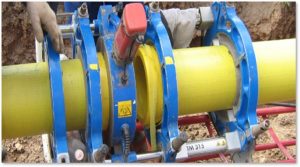 In order to make pipes ready for connection and protect the metal frame from corrosion on the edge of the pipe, we weld a special edge tip with friction welding. The edge tip is thicker than the pipe body and its length and thickness are calculated according to requirements for the pipe joint to withstand pressure. This specific know-how provides assurance that the welding connection is at least as strong as the pipe body.
In order to make pipes ready for connection and protect the metal frame from corrosion on the edge of the pipe, we weld a special edge tip with friction welding. The edge tip is thicker than the pipe body and its length and thickness are calculated according to requirements for the pipe joint to withstand pressure. This specific know-how provides assurance that the welding connection is at least as strong as the pipe body.

